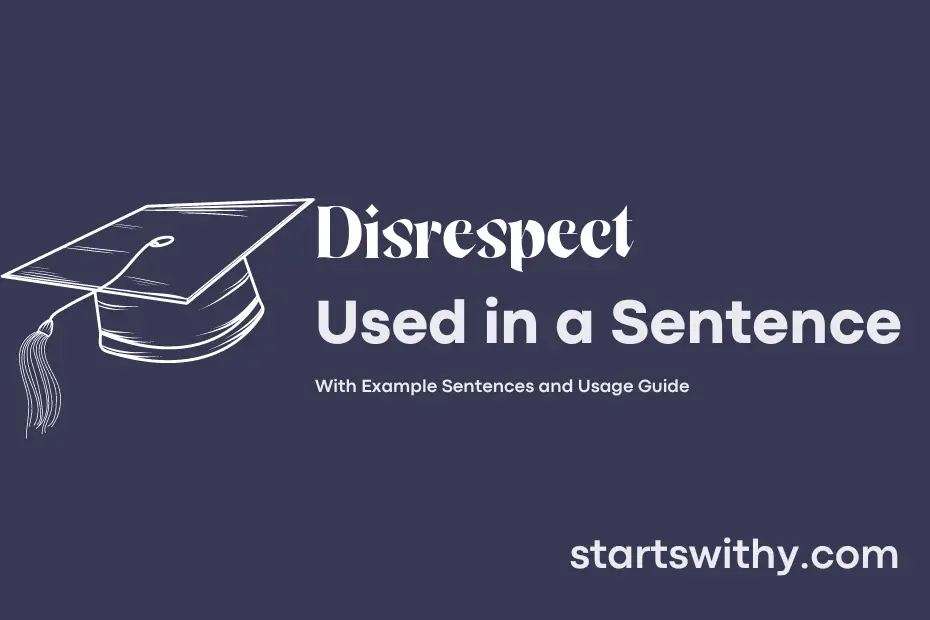Disrespect is the act of showing a lack of respect or rudeness towards someone or something. It can manifest in various forms, including speaking in a contemptuous or insolent manner, disregarding boundaries, or devaluing someone’s feelings or opinions.
The consequences of disrespect can be damaging to relationships, create a hostile environment, and lead to conflicts. It is important to address disrespect promptly and assertively to maintain healthy interactions and cultivate mutual respect among individuals.
7 Examples Of Disrespect Used In a Sentence For Kids
- Disrespect means not treating others nicely.
- We should never show disrespect to our teachers.
- It is important to always be kind and avoid disrespect.
- We should always speak politely and never disrespect anyone.
- We must remember to treat everyone with respect and not disrespect them.
- Let’s always be mindful of our words and actions to avoid disrespect.
- We should always remember to treat others the way we want to be treated and avoid disrespect.
14 Sentences with Disrespect Examples
- Disrespect towards professors can lead to failing grades and academic repercussions.
- Plagiarizing someone else’s work is a form of disrespect towards their hard work and creativity.
- It is important to address any instances of disrespect in group projects to maintain a positive working environment.
- Skipping classes shows disrespect towards the efforts put in by the faculty and can hinder your learning.
- Talking loudly in the library displays disrespect towards those who are trying to study in a quiet environment.
- Not following the dress code for presentations can be seen as disrespect towards the seriousness of the occasion.
- Cheating on exams is a blatant disrespect towards the academic integrity of the institution.
- Ignoring deadlines for assignments shows disrespect towards the professors’ time and effort in preparing them.
- Interrupting a classmate while they are speaking demonstrates disrespect towards their opinions and viewpoints.
- Using foul language in academic discussions is a form of disrespect towards professionalism and courteous behavior.
- Constantly being late to group meetings displays disrespect towards your peers’ time and commitments.
- Ignoring feedback from professors on your work can be seen as disrespect towards their expertise and guidance.
- Not participating in group projects or discussions shows disrespect towards your group members’ efforts and contributions.
- Not cleaning up after yourself in shared spaces showcases disrespect towards your fellow students and the campus community.
How To Use Disrespect in Sentences?
Disrespect should be used carefully in sentences to ensure effective communication. It refers to a lack of respect or rudeness towards someone or something. Here are some tips on how to use it correctly in a sentence:
-
Identify the person or thing being disrespected: Before using the word disrespect, be clear about who or what is being treated without proper respect.
-
Choose the right context: Make sure the situation calls for the usage of disrespect. It should be reserved for instances where disrespect is truly evident.
-
Use the word in a sentence: For example, “It is important not to disrespect others’ opinions during a discussion.”
-
Consider the tone: Pay attention to the tone of your sentence when using the word disrespect. It can come across as strong and negative, so be mindful of how it may be perceived.
-
Be respectful: Even when discussing disrespect, it is essential to remain respectful in your language and attitude towards others.
Remember that disrespect is a powerful word that should be used thoughtfully. By following these guidelines, you can effectively incorporate it into your sentences while maintaining clear and respectful communication.
Conclusion
In interpersonal interactions, using sentences laced with disrespect can lead to strained relationships, hurt feelings, and a lack of mutual understanding. Respectful communication forms the foundation for healthy connections with others, fostering trust and cooperation. When disrespectful sentences are used, they can damage relationships, diminish self-esteem, and create barriers to effective communication.
To build positive relationships and cultivate a harmonious environment, it is crucial to avoid sentences that convey disrespect. By expressing thoughts and feelings in a considerate and respectful manner, individuals can strengthen their connections with others and create a more supportive and understanding environment. Ultimately, choosing to communicate with respect can enhance relationships, promote empathy, and foster a culture of mutual respect and appreciation.



